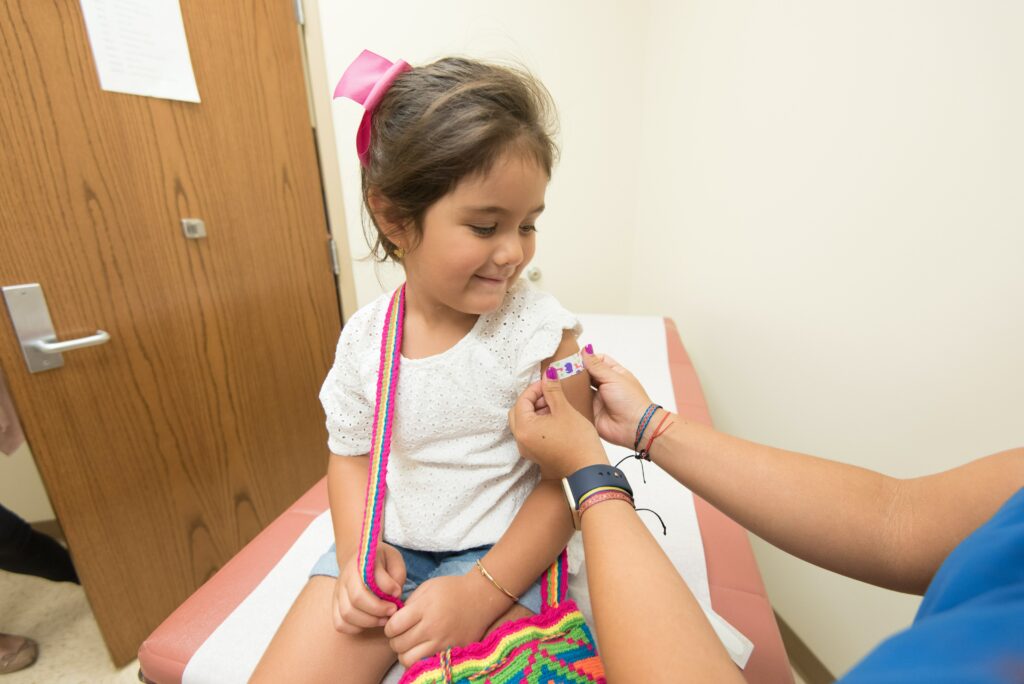State Begins Vaccines For Youngest People
Children aged 6 months to 5 now eligible, as COVID-19 continues to spread across state.

Photo by CDC from Pexels
With children ages 6 months to 5 years old now eligible for the COVID-19 vaccine, health providers are hopeful that vaccination rates will increase in Wisconsin and expand protection from the worst effects of the illness.
Vaccine doses for that youngest age group have begun arriving in the state, and shots should be available within a week, said Karen Timberlake, secretary-designee of the Wisconsin Department of Health Services (DHS), at a media briefing Tuesday.
Wisconsin has an initial allocation of 126,000 doses, half of them the Pfizer vaccine and half the Moderna vaccine. The first batch of those, 48,000 doses, will be distributed around the state soon, Timberlake said.
Khare, who joined the briefing, said that COVID-19 can have severe effects on children, despite the widespread assumption to the contrary.
“We do often hear from people that COVID-19 doesn’t impact children — and to be clear it does,” she said. With the omicron variant, which sent cases spiking at the end of 2021 into early 2022, “the children were hospitalized almost at a rate five times greater than they were with the previous variant.”
Children, she said, also haven’t escaped Long Covid — the lingering, severe effects of the illness that as many as one in five COVID-19 patients have experienced and that last for months after most other patients recover. And a multi-system inflammatory syndrome that sometimes follows COVID-19 “has made a lot of children seriously ill.”
In addition, Khare, who is also the chief mental and behavioral health officer for Children’s Wisconsin, said that children have experienced a sharp increase in emotional and mental health problems over the course of the pandemic.
All those are reasons to ensure that children who are now eligible for the vaccine get it, she said.
Timberlake recommended that parents check with their children’s doctor or other health providers — if they have one — to begin scheduling vaccine appointments, or to ask questions about the vaccine if they are unsure about getting it for their children.
For children whose parents are already bringing them in for regular well-child exams, those regular visits will be an opportunity to offer them the COVID-19 shot, she added.
Parents with or without a regular health care provider relationship for their children can go to the website vaccines.gov to learn about the vaccine and find where it can be obtained, Timberlake said. Those without internet access can call 211 for information.
Timberlake said public health officials believe most Wisconsin residents will be able to use the internet or 211 phone service to get the information they need in order to get a vaccination for themselves or their children. For those who don’t have access to either of those channels, outreach through the news media is another “key strategy,” she said.
DHS has also relied on AMI Expeditionary Healthcare, a private contractor that specializes in working in remote and under-resourced environments. More than a year ago, the state contracted with AMI, which currently provides COVID-19 vaccine clinics in Rock, Racine, Marathon and Douglas counties, Timberlake said. The contractor has also set up mobile or pop-up clinics in other counties, with the state working in partnership with local and tribal health departments, she added.
COVID-19 remains widespread in the state and across the country, Timberlake and Kahre emphasized. On average Wisconsin is reporting about 1,415 cases a day currently, based on data from the last seven days, DHS reported Tuesday.
That is down from a seven-day average of 2,200 new cases a day five weeks ago on May 15. But it’s still nearly four and a half times the most recent low seven-day average, 316 cases a day on March 24.
“While the vaccine helps, we’re not over with this pandemic, and the pandemic isn’t over with us, unfortunately,” Khare said. Other risk-reduction practices — hand-washing, physical distancing and wearing a mask where the spread of the virus and hospitalization rates are high — continue to be important, she said.
“But more than anything, I’d like to say, please remember to stay home when you’re sick,” Khare said. “I think that is one of the things we’ve learned in the last few years — is that we don’t have to tough it out. And we do have an obligation to protect ourselves and everybody around us. So please try to stay home when you’re sick.”
Wisconsin begins ramping up COVID-19 vaccines for the youngest age group was originally published by Wisconsin Examiner
More about the Coronavirus Pandemic
- Governors Tony Evers, JB Pritzker, Tim Walz, and Gretchen Whitmer Issue a Joint Statement Concerning Reports that Donald Trump Gave Russian Dictator Putin American COVID-19 Supplies - Gov. Tony Evers - Oct 11th, 2024
- MHD Release: Milwaukee Health Department Launches COVID-19 Wastewater Testing Dashboard - City of Milwaukee Health Department - Jan 23rd, 2024
- Milwaukee County Announces New Policies Related to COVID-19 Pandemic - David Crowley - May 9th, 2023
- DHS Details End of Emergency COVID-19 Response - Wisconsin Department of Health Services - Apr 26th, 2023
- Milwaukee Health Department Announces Upcoming Changes to COVID-19 Services - City of Milwaukee Health Department - Mar 17th, 2023
- Fitzgerald Applauds Passage of COVID-19 Origin Act - U.S. Rep. Scott Fitzgerald - Mar 10th, 2023
- DHS Expands Free COVID-19 Testing Program - Wisconsin Department of Health Services - Feb 10th, 2023
- MKE County: COVID-19 Hospitalizations Rising - Graham Kilmer - Jan 16th, 2023
- Not Enough Getting Bivalent Booster Shots, State Health Officials Warn - Gaby Vinick - Dec 26th, 2022
- Nearly All Wisconsinites Age 6 Months and Older Now Eligible for Updated COVID-19 Vaccine - Wisconsin Department of Health Services - Dec 15th, 2022
Read more about Coronavirus Pandemic here





















